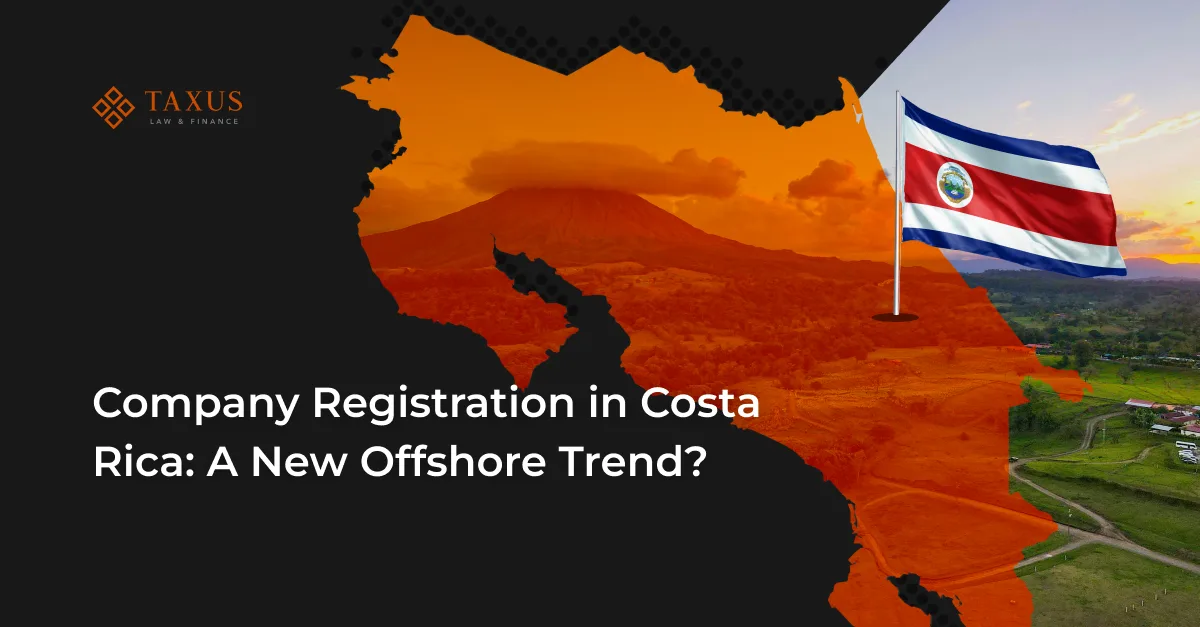Company Registration in Costa Rica: A New Offshore Trend?


As of 2025, Costa Rica is emerging as an attractive alternative to traditional offshore jurisdictions—offering transparent regulation and a low tax burden for businesses operating outside the country. This appeal stems from a combination of a favorable tax regime, political stability, openness to foreign capital, and active participation in international trade agreements. Unlike classic offshore hubs, Costa Rica is not a “black spot” on the map of tax havens, which allows for international operations with less regulatory scrutiny.
Why Choose Costa Rica for Company Incorporation?
Costa Rica is becoming increasingly attractive to entrepreneurs operating in global markets—ranging from IT and consulting to e-commerce and even gambling projects. The country combines tax flexibility with international openness: income sourced from outside Costa Rica is not subject to taxation, and businesses can operate without excessive regulation. Notably, for certain online services—particularly in the gambling sector—local legislation does not require mandatory licensing, which opens additional opportunities to establish a business in Costa Rica without complex regulatory procedures.
Next, we will take a closer look at the key advantages of this jurisdiction.
Business-Friendly Environment and Political Stability
Costa Rica holds a leading position in Latin America in terms of socio-economic development and stability. The country boasts the region’s longest-standing tradition of democratic governance, a functioning legal system, and predictable public policy—all of which create a secure environment for doing business.
Costa Rica is an active member of the United Nations, the Organization of American States (OAS), and the Community of Democracies. It also hosts the Inter-American Court of Human Rights and the University for Peace. The presence of these international institutions underscores the country’s reputation as a lawful, humanistic, and investment-safe jurisdiction.
This image is supported by real-world data: as of 2022, over 400 multinational companies—including Intel, Amazon, IBM, HP, and Bayer—operate in Costa Rica, establishing manufacturing, service, and R&D centers. Many of them choose to operate within free trade zones, further encouraging investment inflows and job creation.
Strategic Location for International Trade
Costa Rica is strategically located between North and South America, with access to both the Pacific and Atlantic Oceans. However, its value as an international business hub goes beyond geography. Thanks to the CAFTA-DR agreement with the United States, companies can export goods to the USA market duty-free under certain conditions, with significantly shorter supply chains than those from Asian countries. This makes Costa Rica a viable alternative for those seeking fast and legal access to the USA and Canadian markets.
The country also has a range of free trade agreements with the EU, Mexico, Chile, Singapore, and even China—giving businesses access to over 2.5 billion consumers.
Equally important, Costa Rica shares a time zone with the United States (GMT-6), making it easy to run remote teams that work in real time with their clients.
Tax Benefits for Offshore Companies
One of the main reasons behind the growing interest in Costa Rica is its territorial tax system. This means that companies are taxed only on income sourced within Costa Rica. Income earned abroad—such as from clients in the USA or the EU—is, as a general rule, not subject to taxation in Costa Rica. This approach enables international companies to structure their financial flows efficiently and avoid double taxation.
An additional advantage is the Free Trade Zone regime, which offers full or partial exemptions from corporate income tax, dividend tax, import duties, and VAT—depending on the type of business activity and location of registration. The conditions are especially favorable for companies in IT, biotechnology, distribution, or back-office services.
Legal Framework for Business Registration in Costa Rica
Costa Rica has a stable and predictable legal system that allows non-residents to freely register and own companies on equal terms with local citizens. The country’s legislation is based on civil law following the Spanish continental model, with clear codified regulations governing commercial, corporate, and tax matters.
Setting up a company in Costa Rica is a process that can be carried out entirely remotely. This is especially appealing for those who do not plan to relocate but still wish to benefit from the jurisdiction’s tax and legal advantages.
Key Business Structures Available in Costa Rica
Entrepreneurs in Costa Rica can register a business as individuals (Individual Limited Liability Company) or set up local entities, with the most common forms being the Sociedad Anónima (S.A.) and Sociedad de Responsabilidad Limitada (S.R.L.). Both types allow for international operations and access to tax advantages.
Sociedad Anónima (S.A.) – a company whose share capital is divided into a specified number of shares.
Key characteristics include:
- Minimum number of shareholders: 2
- Share capital: Divided into share
- Ownership transfer: Free transfer of share
- Governing bodies: Board of Directors (President, Secretary, Treasurer); Statutory Auditor (mandatory and must be independent from the Board)
- Purpose: Suitable for medium to large businesses, scalability, and investment attraction
- Distinctive feature: Ideal for raising capital
Sociedad de Responsabilidad Limitada (S.R.L.) – one of the most commonly used corporate structures in Costa Rica for conducting business.
Key characteristics include:
- A local equivalent of a Private Limited Company.
- Minimum number of partners: 2
- Share capital: Divided into quotas (not shares)
- Ownership transfer: Generally requires consent from other partners
- Governing bodies: One or more directors; a local representative if all partners are non-residents
- Purpose: Suitable for any type of business where a flexible and simple structure is preferred
- Confidentiality: Higher level of confidentiality and simpler management
- Distinctive feature: Quotas in an S.R.L. are not freely transferable—transfer typically requires the approval of other partners. Moreover, one person can act simultaneously as both owner and director, allowing full control of the company to be concentrated in a single set of hands.
The choice between a Sociedad Anónima (S.A.) and a Sociedad de Responsabilidad Limitada (S.R.L.) depends on your business goals and area of activity. An S.A. is more appropriate for medium or large-scale companies—particularly in IT, manufacturing, or investment sectors—where attracting investors and the free transfer of shares are essential.
An S.R.L. is a better fit for small businesses, consulting, or e-commerce, where greater control over ownership and a simpler governance structure are key. Both forms support international operations and benefit from Costa Rica’s favorable tax regime.
Step-by-Step Guide to Open a Company in Costa Rica
1. Choosing the right company type
The first step is to determine which legal structure best fits your business model, scale of operations, and long-term goals. This decision should be based on factors such as the business sector, number of founders, level of control, and operational scope. If assistance is needed, our team of experts is always ready to provide personalized consultation and help you choose the optimal structure.
2. Registering with the National Registry
The next step is registering the company with Costa Rica’s Legal Entities Registry (Registro de Personas Jurídicas). The process begins with selecting a company name—it must be unique, avoid sensitive or reserved terms, and is typically submitted in Spanish. Exceptions are possible: names in other languages may be accepted if they are easily pronounced and understood by local authorities.
Once the name is approved, the company’s incorporation documents are prepared, including information about the founders and director, as well as the registered office address in Costa Rica (a local office is mandatory). At least two founders are required to sign the Memorandum of Association in person before a notary public, who certifies its validity. If all company managers are non-residents, a local representative must be appointed.
3. Documents and Obligatory Steps Following Registration
Upon completing registration, the company receives key apostilled documents:
- Deed of Organization
- Certificate of Incorporation
The process can be completed entirely remotely. It is not necessary to be a resident of Costa Rica to register a company — as long as authorized representatives or agents are appointed to act on the owner’s behalf.
Following registration, the company is required to submit an electronic Transparency and Ultimate Beneficial Owner Declaration to the Central Bank of Costa Rica. Upon submission, the company receives a scanned copy of the declaration and official confirmation of acceptance.
4. Tax registration and compliance
Once legal registration is complete, the company must register with the Dirección General de Tributación (Tax Authority). This registration is mandatory for legally conducting business —filing reports, paying corporate taxes, registering for VAT (if applicable), entering into contracts, and opening bank accounts.
Proper registration also allows the company to benefit from available tax advantages—particularly under the territorial taxation system or within the Free Trade Zone regime. Additionally, the company must implement accounting practices in accordance with local requirements.
Taxation and Financial Advantages for Offshore Companies
Costa Rica is an attractive jurisdiction for international businesses due to its territorial tax system. Under this principle, companies are only taxed on income sourced within Costa Rica. Profits generated abroad—for example, from clients in the USА, Europe, or Asia—are generally not subject to taxation in Costa Rica.
This makes the country particularly appealing for entrepreneurs working remotely or offering services on international markets, including in e-commerce, IT, consulting, agency services, online education, or gambling. Such a tax model enables businesses to legally optimize costs without resorting to complex offshore schemes.
Offshore Company Benefits and Tax Optimization
Key advantages of the territorial tax principle include:
- Exemption from foreign income taxation – If the company operates exclusively outside Costa Rica, its income is not subject to local tax.
- No tax on global income – Enables effective cost structuring.
- Simplified reporting – In the absence of local income, only a declaration of no activity is required.
- Flexibility – Ideal for business models without a physical presence in the country.
Exceptions and limitations:
- Locally sourced income is taxed – At progressive rates ranging from 5% to 30%, depending on profit levels.
- Substance test – If the company is effectively managed from Costa Rica (e.g., has employees in the country), foreign income may be deemed local.
- Tax residency – In case of dispute, a company is considered a Costa Rican tax resident if incorporated in the country or maintaining a permanent establishment.
As of October 2, 2023, to avoid inclusion on the EU’s “grey list,” Costa Rica revised the application of the territorial system. Now, certain types of passive foreign income earned by non-qualified companies are subject to taxation. These include:
- Dividends;
- Interest;
- Royalties;
- Capital gains;
- Gains from real estate appreciation;
- Other income from movable assets.
A non-qualified company is one that belongs to a multinational group but lacks sufficient economic substance in Costa Rica during the reporting period—meaning it does not create jobs, make investments, or maintain a physical office. In such cases, passive income is taxed at local rates.
Corporate Tax Rates and Exemptions
Costa Rica applies a progressive corporate tax rate for companies under the standard regime:
- 5% — on income up to CRC 5.4 million (~USD 10,000);
- 10% — up to CRC 9.1 million (~USD 17,000);
- 15% — up to CRC 12.2 million (~USD 22,000);
- 30% — on income exceeding CRC 12.2 million.
These rates apply only to income earned within Costa Rica. If a company operates solely on international markets, its profits are not taxed locally.

Free Trade Zone (FTZ) Benefits
Costa Rica offers a special tax regime under the Free Trade Zone Law, available to companies that meet specific criteria:
- 0% corporate tax for the first 8–12 years;
- 6% or 15% corporate tax after the initial exemption period;
- Exemptions from dividend tax, import duties, and VAT on most goods and services.
To access these benefits, a company must invest in Costa Rica’s economy, create jobs, and maintain a real local presence. This regime is especially advantageous for IT firms, manufacturing businesses, logistics centers, and digital service providers.
As a result, Costa Rica is not a “classic offshore” jurisdiction but offers regulated tax flexibility within internationally recognized transparency standards, making it highly attractive for global business operations.
FAQ Company Formation in Costa Rica
How to Open a Business in Costa Rica Without Residency?
Yes, foreigners are allowed to open companies and be their sole owners—even without residing in the country. The entire procedure can be carried out remotely through an authorized representative or local attorney.
Is Financial Reporting Required?
Yes. Companies are required to file annual tax returns, even if they have not conducted any business activity. Some companies may also be subject to mandatory audits.
How Long Does It Take to Open a Company in Costa Rica?
Company registration is relatively fast (typically 2–3 weeks); however, the issuance of all necessary documents—due to procedural timelines within Costa Rican authorities—can take up to 2 months.
Conclusion: Is Costa Rica the New Offshore Hub?
Despite its attractive tax policies, Costa Rica is not a classic offshore jurisdiction in the traditional sense. It is excluded from the EU’s “offshore lists” and officially complies with international standards on transparency, financial information exchange, and anti-tax avoidance.
Unlike traditional offshore havens, Costa Rica requires companies to maintain tax compliance, submit regular filings, and adhere to economic substance rules. While the Beneficial Ownership Registry is not public, it does exist and is accessible to government authorities.
At the same time, the jurisdiction offers genuinely favorable conditions—particularly the territorial tax principle, which exempts foreign-sourced income from taxation. This makes it an appealing choice for international businesses seeking to combine tax efficiency with legal transparency.
In summary, Costa Rica is not a typical offshore, but rather a modern low-tax jurisdiction that attracts entrepreneurs with its balanced approach: minimal tax burden paired with compliance with global standards.

Looking for a reliable payment processing system?
Order selection of a payment solution.












